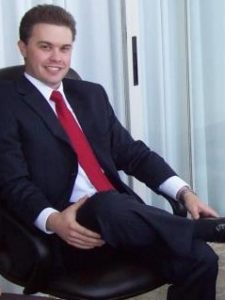
Selim Tira
Sciences Po
Paris (48.8° N, 2.3° E)
featuring Micah Johnson, founder of an investment partnership, Houston (29.7° N, 95.3° W)
After seven years as a senior analyst and co-portfolio manager for Smith Warren and Associates, a leading wealth  management team of Merrill Lynch, Micah Johnson launched his independent investment partnership. Throughout his career, Micah’s goal has always been to make the best out of his clients’ capital by investing in assets in the financial markets.
management team of Merrill Lynch, Micah Johnson launched his independent investment partnership. Throughout his career, Micah’s goal has always been to make the best out of his clients’ capital by investing in assets in the financial markets.
Listening to Micah’s journey, from his early entrepreneurship experiences to his most recent position as a senior analyst and co-portfolio manager at Smith Warren and Associate, and finally to his current project, is a lesson on how to take an entrepreneurial path in the investment world. Interviewing him was extremely enriching for multiple reasons. First, he describes his professional journey as “the intersection of finance and entrepreneurship.” Second, his experience building a career during the 2008 recession helps him now to better understand financial challenges linked to the coronavirus crisis.
Micah’s interest in entrepreneurship appeared early in his life and took many forms. He believes that it first manifested when he created his music band as a teen, which he not only performed in, but also managed. At the age of 15, he successfully managed to book a tour, which he considers “a business venture in itself.” Going around the big state of Texas with his band mates, he got early glimpses into operating and managing a project.
Micah defines entrepreneurship as “organizing around some objective you have or idea that you want to put into action, whether it’s a product or a service, and execute on that.” That was what he did when he started a car wash business at 16 years old. At its peak, the venture employed about 18 of Micah’s closest high school friends. Entrepreneurship and management were his first entry into the business world, and over time, his interests shifted to investment. He wanted to “understand what made a company not just a great company, but a great investment.”
Micah also underlines the important roles that mentors played in each step of his professional and personal life. He identified three “primary mentors” that have had a huge impact on his continued move forward. The first ones were his parents; as a child, watching them grow their business was extremely helpful. “The younger you are exposed to certain qualities, the more it’ll become a part of your DNA, that is human nature.” There was also a restaurant owner who willingly answered all Micah’s questions and let Micah follow him around and learn all about his business. Micah reached out to his third mentor, Bruce Greenwald, via email when he was 20 years old. As the head of the Investment Program of Columbia University in New York, Bruce advised Micah on his career. They talked over a cup of coffee and since then they meet almost every year. Micah remarks fondly, “He is a wealth of knowledge”.
Micah joined Smith Warren and Associates in 2012. He graduated from University of Houston at Clear Lake with a bachelor degree in finance in December 2008, but because of the great recession, it was a very challenging time for recent graduates to secure jobs. Micah boldly offered to work for free as an intern when he heard that one of the analysts left. The team agreed to offer him an intern position. He applied a very strict work ethic as the first to arrive in the office and the last to leave and showed them that he had his place in their team. After six months, the team offered him a position as a full-time analyst. His experience shows that even in the most difficult times, there is no such thing as a closed door if you have enough determination.
Micah spent seven years at Smith Warren and Associates and gradually gained more experience and earned more responsibilities. Prior to leaving the firm, he was a senior analyst, co-portfolio manager, and senior trader for 12 ultra-high net worth discretionary portfolios totaling $1.2 billion in client assets. According to Micah, it is very important to stay at the top of the game in terms of technical knowledge and understanding of investment strategies. For him, you must keep learning whatever your field is, that is why he took the Chartered Market Technician and Chartered Financial Analyst exams. He now holds the CMT designation and is a Level III Candidate in the CFA program; the two globally recognized professional designations that have allowed him to deepen his financial and technical knowledge.
Micah also emphasizes the importance of understanding investment dynamics to be a better manager. “At the CEO and CFO role of any company, it is pertinent that individuals understand the investment side also because it creates so much more value. Make sure that the overall direction of the firm is oriented towards creating value and positioning its brand based on the industry’s competitive dynamics in a way that will maximize the value of the business over time.”
Exchanging with Micah was a unique occasion to peer into the mind of a wealth manager and entrepreneur. Along these lines, Micah gives me very good general advice that can be applied in all investment situations, whether you buy a car, a house, a stock, or a company: “Buy great assets at fair prices, or fair assets at great prices.”
Lastly, Micah says, “Those who you surround yourself with professionally and personally will play a material part in the outcome of your path, whether career or personal. Show me your friends, and I’ll show you your future.”
Highlights from the interview:
How did you get your first job?
I was trying to get into the investment business when I graduated in December 2008, which is the equivalent of graduating right now in the current coronavirus environment. We were going through the financial crisis and trying to get a job in the financial industry was very challenging, so you needed to have experience. I did not take on any internships in college because I was too busy running my business, which looking back, was a mistake. I should have also taken on internships to get my foot in the door.
I talked to my mentor Bruce Greenwald about this, and he advised me to stay in Houston and find a team that I had a personal relationship tie to because with a bachelor’s degree and no experience in the field, it would be difficult to secure a position elsewhere.
Therefore, I had to do a little extra work reaching out to try to secure a position. My goal was not to secure just any position, but to secure the position that I was looking for. The one that would allow me to learn, better understand capital markets, and get excellent hands-on experience in portfolio management.
I got word that a Smith, Warren and Associates’ analyst had left. I showed up at 7:30 the next morning, my resumé in hand, and told them that I was willing to work for free if they gave me a chance. Fortunately, if you are persistent enough and you have put in the effort, sometimes it can work out. It did in that case.
How was your first job experience?
I was the first guy in the office, the last guy out. I just wanted to understand capital markets and learn portfolio management. That is the only team I have worked on, and it was a fantastic experience for seven years. I was an intern for about six months. I was not paid but it was ok because I knew that once I had that internship within the fourth largest team at Merrill Lynch, I could go to any other wealth management shop and get a job as an analyst.
I made sure I learned the right things and gave them a reason to not want to let me go by taking care of everything I possibly could for them. I just basically tried to take the weight off their shoulders. In the end, they offered me the job. And then, as I continued to apply the same work ethic over time, they gave me more and more responsibilities.
And then once I got the job it was just about working as much as I could, which included going through the CMT program to learn technical analysis, going through the CFA program to learn fundamental analysis, and improving my skills.
Why did you decide to leave Merrill?
My goal was to learn capital markets. Once I realized that I achieved that, I thought, “OK I’ve been here seven years, I understand capital markets, and I’m ready to apply this elsewhere.” In my college years, the expectation from my family was that I would take more of a management route, but I ultimately changed to finance. And while I believe that I learned management skills from my parents and other mentors, I ultimately decided that I could also apply those management skills to my passion for investing and build an investment firm. I left Merrill in August 2019 to start my own shop and go after my own deals because I was starting to find excellent opportunities. When I left, they wrote me a very nice recommendation letter saying that I was their best and hardest working investment analyst that they had had in their 25 years as a team.
What would you say were the main skills that were necessary to work as a wealth manager?
You can go in still being semi-new to it, but you must be dedicated to research every day. And you must be dedicated to understanding that research, which constitutes a lot of reading. You need excellent Excel skills, and that is something you can develop over time, but you need to have a strong base going in. When I was on the team, I had an internship program where I would bring on interns. And I would always give them an Excel test. And at most job interviews for an analyst position, you will get an Excel test, so you need to be prepared for that. You need to learn over time how to use a Bloomberg terminal and similar sources. And then, I would say attention to detail is very important. You cannot make mistakes when you are trading portfolios of $1 Billion+ size. You will inevitably make a mistake at some point, but you must minimize those as best you can and make sure that you never have a massive error. If you do, you’re not paying attention to details. I think what really allowed me to progress in that position was both my attention to details and making sure everything was always accurate. The team could count on me to almost always find all mistakes and always correct them before execution.
And then lastly, like I said, being the first one in the door and the last one out and really trying to be the hardest worker on the team is very important. It is something you can always do, and people will always respect you for that. It will always give you the opportunity to move higher and higher and do more and more and more. And so, I always try to apply that.
Interview excerpts have been lightly edited for clarity and readability and approved by the interviewee. This article only aims to share personal opinions and learnings and does not constitute the interviewee’s current or former employer(s)’ position on any of the topics discussed.
